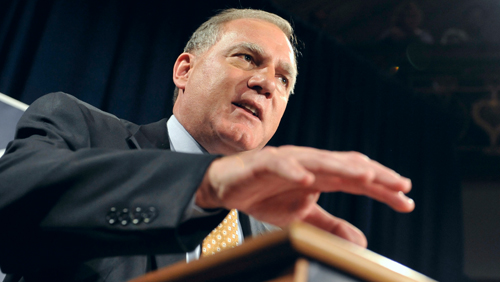MGM Resorts’ lawsuit to block a third Connecticut casino should be dismissed, says Connecticut AG George Jepsen.
 Connecticut Gov. Dannel Malloy approved legislation in June allowing the Mashantucket Pequot and the Mohegan tribes to issue a request for proposals from municipalities expressing their interest to host the state’s third casino. The tribes plan to build a jointly run $300m casino along Interstate 91, to compete with MGM Resorts’ $800m casino just across the border in Springfield, Massachusetts.
Connecticut Gov. Dannel Malloy approved legislation in June allowing the Mashantucket Pequot and the Mohegan tribes to issue a request for proposals from municipalities expressing their interest to host the state’s third casino. The tribes plan to build a jointly run $300m casino along Interstate 91, to compete with MGM Resorts’ $800m casino just across the border in Springfield, Massachusetts.
MGM got mad and vowed to block the tribe’s proposed commercial casino, which it described as a “box of slots.”
MGM filed a lawsuit in August against Malloy, saying that the bill he signed is “unconstitutional” because it gives the two tribes “preferential treatment” while barring out-of-state competitors from developing a casino in Connecticut.
Assistant Attorney General Robert Deichert filed a motion in September asking U.S. District Judge Alvin Thompson to dismiss the lawsuit, arguing that MGM has no legal standing to sue, offering a dry legal argument about timing, as well as a juicier suggestion that the company fabricated an interest in building its own casino in Connecticut.
Fast forward to December, when Jepsen said in a new federal court filing that the legislature has allowed the tribal leaders of Foxwoods and Mohegan Sun to seek proposals for a location of a possible future commercial casino but it does not mean that the state has received an approval to expand casino gambling beyond their respective reservations.
“The possible future commercial casino at issue has not been authorized and may never be authorized, and, even if it were, MGM cannot credibly allege that it would compete for [all potential sites] because MGM admits that it could not bid on a casino in most of Connecticut because of the 50-mile radius restriction,” wrote Deichert in the filing.
Bernard Kavaler, an MGM spokesman, told the Hartford Courant that the casino remains confident that the court will determine the law passed last year to be “unconstitutional.”
“The state should also have put in place a fair, open, transparent and competitive process. That’s what other states do when they create a path to state-endorsed commercial casinos. But Connecticut didn’t do that,” said Kavaler.
The tribes received five site proposals for its joint casino project and are expected to make its decision later this year.





